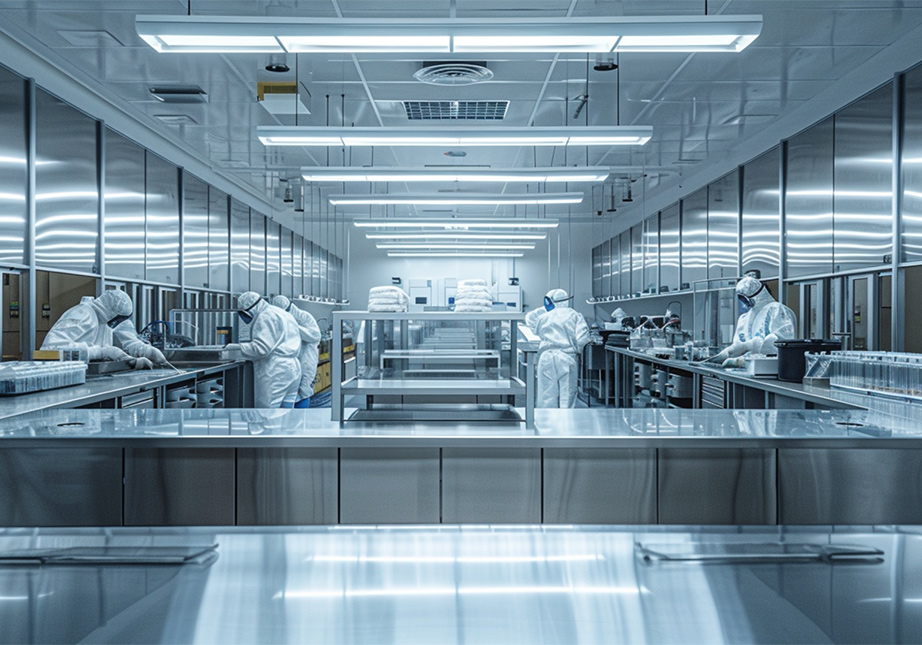
Jun 07, 2024
Food Manufacturing Cleanrooms
Understanding Cleanrooms in Food Manufacturing
Cleanrooms are specialized environments within food production facilities designed to control airborne particles, microbes, and other contaminants. Their primary role is to maintain stringent hygiene standards, crucial for ensuring the safety and quality of food products. By leveraging advanced air filtration systems, such as High-Efficiency Particulate Air (HEPA) and Ultra Low Penetration Air (ULPA) filters, cleanrooms effectively minimize the risk of contamination.
Key Components of Food Manufacturing Cleanrooms
The essential elements of a cleanroom include:
- Controlled Air Quality: Utilizing HEPA or ULPA filtration systems to maintain particulate-free air.
- Regulated Environmental Conditions: Precise control over temperature, humidity, and pressure to prevent microbial growth and ensure product integrity.
- Designed Surfaces and Materials: Surfaces are constructed from non-toxic, non-porous materials that are easy to clean and resistant to harboring contaminants.
- Modular Design: Facilities like those provided by G-Con offer modular cleanroom solutions that are customizable and scalable, catering to the specific needs of food production and packaging.
Importance of Cleanrooms in Food Safety
Cleanrooms are critical in food manufacturing as they:
- Prevent Cross-Contamination: By maintaining a controlled environment, cleanrooms reduce the risk of cross-contamination between products, which is paramount for consumer safety.
- Comply with Regulations: Adherence to standards such as Current Good Manufacturing Practices (CGMP) and National Sanitation Foundation (NSF) is essential for legal compliance and consumer trust.
- Support Quality Assurance: Cleanrooms contribute to the overall quality assurance process by ensuring that food products are manufactured in a contaminant-free environment.
At G-Con, we understand the significance of these controlled environments in the food industry. Our commitment to providing comprehensive cleanroom solutions ensures that your operations meet the highest standards of safety and quality.
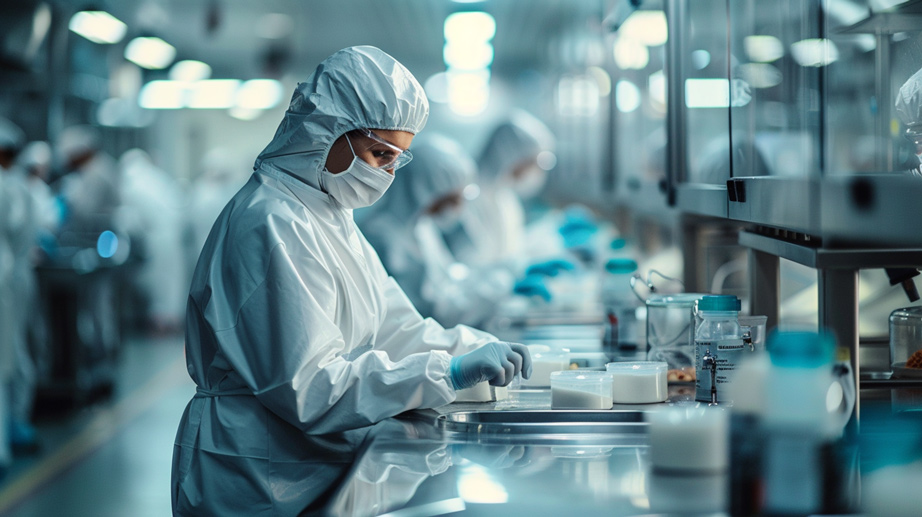
Standards and Regulations for Food Manufacturing Cleanrooms
International and National Standards
In the realm of food manufacturing, cleanrooms are governed by a series of stringent international and national standards. These standards ensure that the environments in which food is produced are free of contaminants that could compromise food safety and quality. ISO classifications, such as ISO Class 6, define the level of cleanliness required by specifying the maximum allowable number of particles per cubic meter of air. Adhering to these standards is not just a matter of compliance, but a commitment to consumer safety.
ISO Classifications Impact
ISO classifications profoundly influence the design and operation of cleanrooms in food manufacturing. For instance, an ISO Class 6 cleanroom has specific requirements for air filtration, environmental control, and monitoring systems. These standards dictate the type of HEPA or ULPA filtration systems needed, the design of airlocks, and the materials used for surfaces within the cleanroom to prevent contamination.
FDA’s Regulatory Role
The Food and Drug Administration (FDA) plays a pivotal role in regulating cleanrooms for food production. Their guidelines encompass the construction, validation, and operation of cleanrooms, ensuring that facilities meet the Current Good Manufacturing Practices (CGMP). These regulations are designed to protect public health by ensuring that food products are produced under conditions that prevent contamination.
Ensuring Compliance
To ensure compliance with cleanroom standards and regulations, companies must implement comprehensive quality management systems. This includes regular auditing, validation of cleanroom performance, and adherence to sanitation protocols. Our modular cleanroom solutions are designed with these standards in mind, providing you with environments that meet CGMP and NSF standards for food equipment and facility sanitation.
By maintaining rigorous standards and regulations, we ensure that our cleanroom solutions support the integrity and safety of your food manufacturing processes.
Key Considerations in Cleanroom Design for Food Manufacturing
When designing a cleanroom for food production, several critical factors must be considered to ensure the safety and quality of food products. These considerations are pivotal in creating an environment that meets the stringent standards required for food manufacturing.
Airflow, Pressure, Temperature, and Humidity Control
Control of airflow, pressure, temperature, and humidity is essential in maintaining the integrity of a cleanroom. Proper airflow patterns and pressure differentials prevent cross-contamination, while temperature and humidity control are vital for preventing the growth of microorganisms and ensuring comfort for personnel.
Preferred Materials and Surfaces
The materials and surfaces used in cleanroom construction must be non-toxic, impervious, and easy to clean. Stainless steel and non-porous materials are commonly used for their durability and resistance to harsh cleaning agents. Surfaces must also be designed to minimize particle retention and facilitate easy sanitation.
Streamlining Design with Modular Solutions
Modular cleanroom solutions, such as those provided by G-Con, offer a streamlined approach to cleanroom design. Our modular cleanrooms, including HardWall, RigidWall, and SoftWall options, are customizable and scalable, allowing for rapid deployment and flexibility in design to meet the specific needs of your food production processes.
By incorporating these design principles, we ensure that our cleanroom solutions not only meet but exceed the expectations for food manufacturing facilities, providing you with a controlled environment that upholds the highest standards of safety and quality.
Contamination Control Strategies in Cleanrooms
Contamination in food manufacturing cleanrooms can arise from various sources, including personnel, equipment, and airborne particles. Effective control strategies are critical to mitigate these risks.
Types of Contamination
Contaminants in cleanrooms can be broadly categorized into particulate, microbial, and cross-contamination. Particulate contamination includes dust and other small particles, while microbial contamination refers to bacteria, viruses, and fungi. Cross-contamination occurs when these contaminants are transferred between products or surfaces.
Role of Filtration and Air Showers
HEPA (High-Efficiency Particulate Air) filters play a crucial role in removing particulate contaminants from the air. These filters are capable of trapping particles as small as 0.3 microns, ensuring the air within the cleanroom meets the required cleanliness standards. Air showers are used to remove contaminants from personnel and equipment before entering the cleanroom, further reducing the risk of contamination.
Monitoring and Maintenance
Regular monitoring and maintenance are essential to prevent contamination. This includes routine checks of air quality, filter integrity, and surface cleanliness. Scheduled maintenance ensures that all cleanroom components function optimally and that any potential contamination sources are addressed promptly.
At G-Con, we understand the importance of contamination control. Our modular cleanroom solutions are designed with advanced lighting, air systems with HEPA or ULPA filtration, and environmental controls to maintain temperature, humidity, and particle levels, ensuring your cleanroom operates at peak performance.
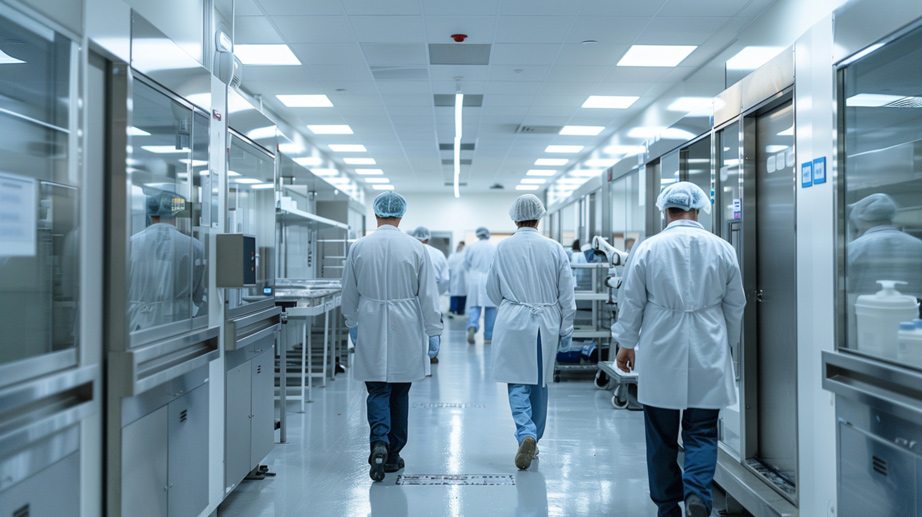
Essential Equipment for Food Manufacturing Cleanrooms
In food manufacturing cleanrooms, the selection of appropriate equipment is paramount to maintain a sterile environment and ensure product integrity. As a procurement manager, you’re tasked with choosing supplies that not only comply with stringent industry standards but also enhance operational efficiency.
Selecting the Right Cleanroom Supplies
When selecting cleanroom supplies, consider the following:
- Compatibility with Cleanroom Standards: Equipment must meet specific cleanroom classifications, such as ISO Class 6 compliance, which dictates the level of cleanliness by controlling particulate matter in the air.
- Material Integrity: Choose non-toxic, non-shedding materials that can withstand rigorous cleaning protocols without degrading.
- Efficiency and Durability: Opt for equipment that promises longevity and supports streamlined cleanroom operations.
Considerations for Cleanroom-Compatible Materials
Materials used in cleanrooms must be:
- Non-Porous: To prevent bacterial growth and facilitate easy cleaning.
- Chemically Resistant: To endure sanitation with harsh cleaning agents.
- Able to Maintain Integrity: Under the specific environmental conditions of the cleanroom, such as controlled temperature and humidity.
G-Con’s Modular Cleanroom Technology
Our modular cleanroom solutions at G-Con are designed to support efficient operations by offering:
- Customizability: Tailored to fit the unique needs of your food manufacturing process.
- Scalability: Easily expandable to accommodate growth or changes in production.
- Integration with Advanced Systems: Including LED lighting, HEPA filtration, and environmental controls for temperature and humidity.
By ensuring these criteria are met, you can maintain the integrity of your food manufacturing cleanroom and uphold the highest standards of safety and quality.
Operational Protocols and Staff Training in Cleanrooms
Ensuring the safety and quality of food products begins with strict adherence to Standard Operating Procedures (SOPs) and comprehensive staff training within cleanrooms.
Essential Standard Operating Procedures
For cleanroom staff, SOPs are the foundation of maintaining a contamination-free environment. These include:
- Gowning Protocols: Detailed steps for donning cleanroom garments to prevent outside contamination.
- Hygiene Practices: Mandatory handwashing and sanitizing procedures to minimize microbial transfer.
- Equipment Handling: Correct usage and sanitation of tools and machinery to uphold cleanliness standards.
Gowning and Hygiene Best Practices
Cleanroom technicians play a crucial role in enforcing gowning and hygiene practices. This involves:
- Regular Audits: Conducting periodic checks to ensure compliance with gowning procedures.
- Visual Guides: Displaying clear instructions for gowning and hygiene practices within the cleanroom.
Effective Training Programs
Training programs for cleanroom staff must be:
- Comprehensive: Covering all aspects of cleanroom operations, from entry to exit procedures.
- Regularly Updated: Reflecting the latest standards and technological advancements in cleanroom management.
Frequency of Protocol Updates
To remain compliant with evolving industry standards, cleanroom protocols and training should be reviewed and updated:
- Annually: To incorporate regulatory changes and feedback from cleanroom operations.
- After Significant Events: Such as the introduction of new equipment or processes.
At G-Con, we understand the importance of these protocols and offer support to ensure your staff is well-trained and your operations remain compliant with the highest standards.
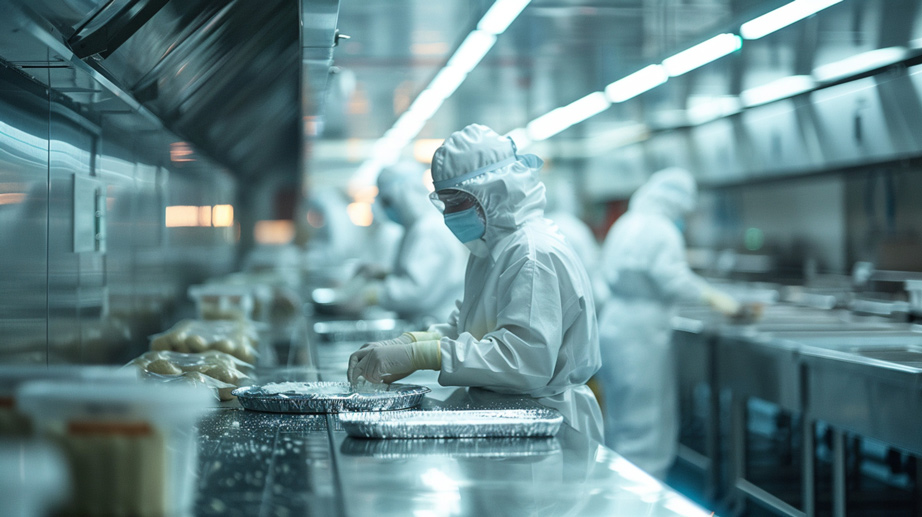
Monitoring, Validation, and Maintenance of Cleanrooms
Maintaining the integrity of a cleanroom is essential for ensuring the safety and quality of food products. At G-Con, we prioritize the implementation of robust monitoring, validation, and maintenance protocols.
Monitoring Cleanroom Conditions
To ensure ongoing compliance with industry standards, cleanrooms must be continuously monitored. This involves:
- Environmental Monitoring: Utilizing particle counters and microbial samplers to assess air quality.
- System Checks: Regularly inspecting HEPA filters and air handling units for optimal performance.
Cleanroom Validation in the Food Industry
Validation of cleanrooms in the food manufacturing industry is a multi-step process that includes:
- Installation Qualification (IQ): Verifying that equipment and systems are installed correctly.
- Operational Qualification (OQ): Ensuring that the cleanroom operates according to design specifications under dynamic conditions.
- Performance Qualification (PQ): Confirming that the cleanroom consistently performs to the required standards during actual production conditions.
Critical Maintenance Practices
Key maintenance practices for sustaining cleanroom standards include:
- Scheduled Cleaning: Adhering to a strict cleaning regimen using approved sanitizing agents.
- Preventive Maintenance: Conducting routine inspections and servicing of cleanroom equipment to prevent unexpected failures.
Advantages of Modular Cleanrooms
Our modular cleanrooms offer several benefits for maintenance and upgrades:
- Flexibility: Easily reconfigurable layouts to adapt to process changes.
- Accessibility: Design features that allow for straightforward access to critical systems for maintenance.
By following these guidelines, you can ensure that your cleanroom remains a reliable cornerstone of your food manufacturing process.
Technological Advancements in Cleanroom Design and Operation
The landscape of cleanroom technology is continually evolving, with innovations that enhance the safety and efficiency of food manufacturing processes. At G-Con, we are at the forefront of integrating these advancements into our modular cleanroom solutions.
Innovations in Cleanroom Technology
Recent innovations in cleanroom technology include:
- Smart Monitoring Systems: Real-time monitoring of environmental conditions, such as temperature and humidity, to ensure consistent compliance with standards.
- Advanced Filtration Systems: Utilization of ULPA (Ultra Low Particulate Air) filters that exceed the performance of traditional HEPA filters, capturing even smaller particulate matter for superior air quality.
Automation’s Role in Modern Cleanrooms
Automation plays a critical role in modern cleanrooms by:
- Enhancing Precision: Automated systems provide precise control over environmental conditions, reducing the risk of human error.
- Increasing Efficiency: Automation streamlines cleanroom operations, from air filtration to lighting, leading to more efficient production cycles.
Staying Ahead with Cleanroom Technologies
To stay ahead with the latest cleanroom technologies, companies should:
- Regularly Evaluate Systems: Assess current cleanroom technologies and identify areas for improvement or upgrade.
- Partner with Industry Leaders: Work with companies like G-Con that specialize in cutting-edge cleanroom design and are committed to innovation.
By embracing these technological advancements, you can ensure that your cleanroom facilities are equipped to meet the exacting demands of food manufacturing, both now and in the future.
Cost Considerations for Setting Up and Operating a Cleanroom
When planning for a cleanroom in food manufacturing, understanding the financial implications is crucial. Initial setup costs can be significant, encompassing construction, equipment, and technology investments. Operational expenses, such as energy consumption, maintenance, and staffing, also contribute to the overall cost.
Optimizing Cleanroom Operations to Reduce Expenses
To optimize cleanroom operations and reduce expenses, consider the following strategies:
- Efficient Design: Opt for a layout that maximizes space utilization and minimizes material waste.
- Energy-Saving Technologies: Implement LED lighting and energy-efficient HVAC systems to lower utility costs.
- Preventive Maintenance: Regular upkeep can prevent costly repairs and downtime.
Role of Modular Cleanrooms in Cost Optimization
Modular cleanrooms, like those we offer at G-Con, play a pivotal role in cost optimization by providing:
- Scalability: Expand or modify your cleanroom as needed without extensive reconstruction costs.
- Speed of Installation: Reduce downtime with quick assembly and commissioning.
- Customization: Tailor your cleanroom to your specific needs, avoiding unnecessary expenses for features you don’t require.
Enhancing Energy Efficiency in Cleanroom Operations
Improving energy efficiency in cleanroom operations involves:
- Smart Environmental Controls: Use automated systems to adjust conditions only as needed.
- Regular System Audits: Identify areas where energy use can be reduced without compromising cleanroom standards.
By addressing these aspects, you can manage and even reduce the costs associated with your cleanroom operations, ensuring financial sustainability alongside compliance and safety.
Seamless Integration of Cleanrooms in Food Manufacturing
Integrating cleanrooms into existing food manufacturing processes requires meticulous planning and execution. Our modular cleanroom solutions at G-Con are designed to align with your production needs, ensuring a seamless integration.
Challenges in Cleanroom Integration
Integrating cleanrooms presents several challenges:
- Space Constraints: Existing facilities may have limited space, necessitating compact and efficient cleanroom designs.
- Process Alignment: Cleanroom operations must synchronize with production workflows to avoid bottlenecks.
- Cross-Contamination Risks: Ensuring that integration does not introduce new contamination pathways is critical.
Overcoming Integration Challenges
To overcome these challenges:
- Custom Design: We tailor cleanroom designs to fit within the constraints of your existing facility.
- Workflow Analysis: Our team analyzes your processes to ensure cleanroom operations enhance, rather than disrupt, your workflow.
- Contamination Control Planning: We implement stringent contamination control measures to protect against cross-contamination during and after integration.
Flexibility of Modular Cleanrooms
Modular cleanrooms offer:
- Adaptability: Easily modified to accommodate changes in production or expansion.
- Rapid Deployment: Quicker installation times minimize disruption to ongoing operations.
Benefits of Well-Integrated Cleanrooms
A well-integrated cleanroom in food production ensures:
- Enhanced Product Safety: Reduced risk of contamination leads to safer food products.
- Operational Efficiency: Streamlined processes result in increased productivity and cost savings.
- Regulatory Compliance: Adherence to standards such as CGMP and NSF is simplified with a well-designed cleanroom.
By addressing these key points, you can achieve a cleanroom integration that supports the integrity and efficiency of your food manufacturing processes.
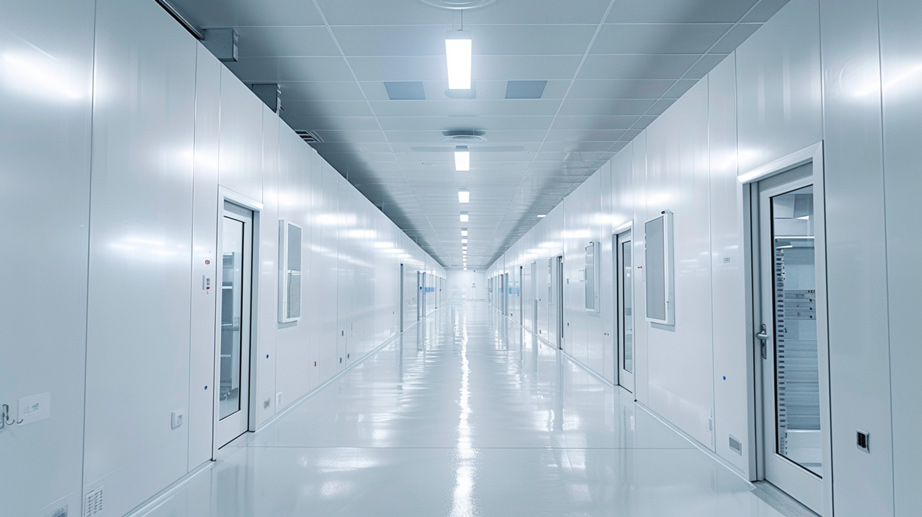
Navigating Regulatory Compliance and Certification
Navigating the complex landscape of cleanroom regulations is a critical step in ensuring the safety and quality of food manufacturing processes. At G-Con, we guide you through the intricate web of compliance requirements.
Steps for Cleanroom Certification
The certification process for cleanrooms in food manufacturing involves several key steps:
- Pre-Assessment: A preliminary evaluation to identify any potential compliance issues.
- Documentation Review: Ensuring that all necessary documents, such as SOPs and validation protocols, are in place and up to date.
- On-Site Inspection: A thorough examination of the cleanroom to verify adherence to regulatory standards.
- Corrective Actions: Addressing any non-compliance issues identified during the inspection.
- Certification Issuance: Once compliance is confirmed, a certification is granted, signifying that the cleanroom meets all regulatory requirements.
Impact of Compliance on Cleanroom Design
Compliance with regulations directly influences cleanroom design and operation. It dictates the:
- Air Filtration Systems: Selection of appropriate HEPA or ULPA filters to meet particle count standards.
- Environmental Controls: Implementation of systems to manage temperature, humidity, and pressure.
- Material Selection: Use of non-toxic, cleanable surfaces to maintain a sanitary environment.
Essential Documentation for Regulatory Compliance
Maintaining comprehensive records is essential for regulatory compliance. This includes:
- Validation Records: Documenting the performance and efficiency of cleanroom systems.
- Training Logs: Keeping track of staff training on cleanroom protocols and procedures.
- Maintenance Schedules: Recording regular upkeep and any repairs of cleanroom equipment.
By adhering to these guidelines, you can ensure that your cleanroom is not only compliant but also operates at the highest standard of excellence.
Partner with G-Con for Your Cleanroom Solutions
At G-Con, we specialize in providing turnkey modular cleanroom solutions tailored to the unique requirements of food manufacturing. Our expertise ensures that your cleanroom project aligns with industry standards and optimizes your production process.
Designing and Implementing Custom Cleanrooms
Our team collaborates with you to design a cleanroom that:
- Meets Specific Needs: We consider your production requirements, space constraints, and regulatory compliance needs.
- Incorporates Advanced Technologies: Including HEPA and ULPA filtration systems, and smart environmental controls for air quality and contamination prevention.
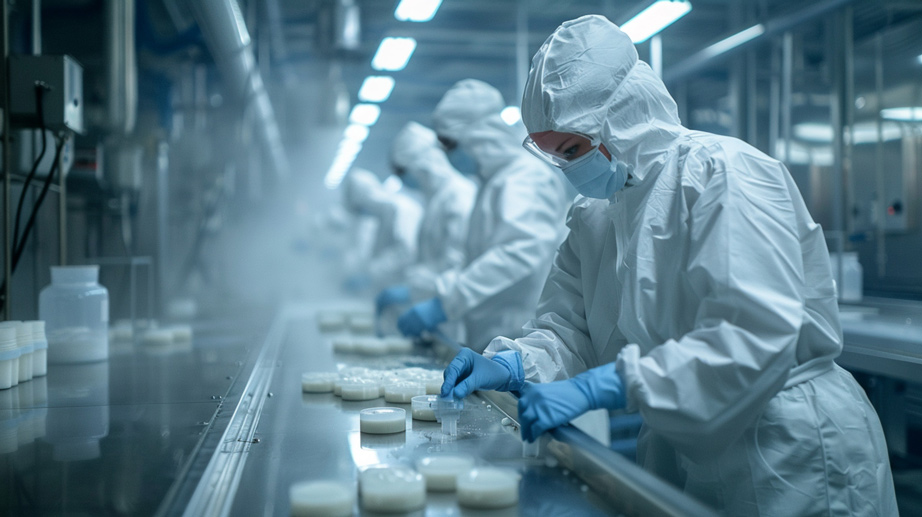
Support for Regulatory Compliance
We offer comprehensive support to navigate the complex landscape of regulatory compliance:
- Guidance on Standards: Our experts are well-versed in FDA, ISO, and CGMP requirements and will help you understand and meet these standards.
- Documentation and Validation: We assist in preparing the necessary documentation and validation protocols to ensure your cleanroom meets all regulatory expectations.
Starting Your Modular Cleanroom Project
To initiate a modular cleanroom project with us:
- Consultation: Reach out for a consultation to discuss your specific needs.
- Project Planning: We will guide you through every step, from design to implementation.
Why Choose G-Con
Selecting G-Con for your cleanroom needs ensures:
- Quality and Expertise: With years of experience in the field, we are committed to delivering high-quality cleanrooms.
- Customer-Centric Approach: We prioritize your needs and work diligently to provide solutions that enhance your food manufacturing processes.
Contact us today to learn how our modular cleanroom solutions can benefit your food manufacturing operations.